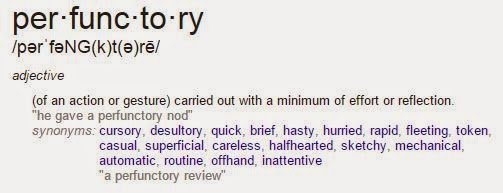Perfunctory.
This word has been rattling around in my head all on its own for two days now. I can’t shake it. Worse than an ear worm (where that song you just heard has you humming the melody all day as you walk around at work) this word worm is taunting me. Taunting, I say! Those familiar with the word will notice just a wee bit of irony with the fact that I’ve been unable to escape it:
 |
It’s as if my muse decided to implement guilt in the most creative way possible (as muses are wont to do):
“I couldn’t help but notice that you’re being a bit of a slacker. So, rather than bestowing great inspiration upon you I’m going to stick this one word in your head, and nothing else, until you get the damn point. Fifteen pieces of flair ain’t gonna cut it in this Chotchkie’s, pal! Now get writing.”
To which, on most days, I would tell my muse where to stick it much like Jennifer Aniston’s character in Office Space did to her boss a few scenes later. This week is different though. Off the heels of my controversial (at least in some circles) post on freedom of expression (not freedom from consequences) last week, it turns out I was in dire need of a post topic for this week. So here we are.
Not as frequently as the dreaded ear worm, but likely more frequently than non-writers, I find myself with one particular word bouncing from ear to ear literally begging me to use it properly (see what I did there?) Most of the time I can’t uncover an explanation for it, with perfunctory being the exception. It’s usually a random word that I have no recollection of hearing in conversation or reading in print. Eventually it finds a crack in my head (there are many) to slip out through and I’m left wondering what exactly it was and why I gave a damn about it for so long. I think I’m going to start keeping a list.
List of Andrew’s Word Worms:
- Perfunctory
This happens with even the simplest of words too. I was writing a software “how to” document another lifetime ago and after every action I needed to instruct the user to use the mouse to click on “Exit”. After typing that word dozens and dozens of times my eyes started playing tricks on me. Every time I looked at it I was checking to make sure it was spelled correctly. Exit. Exit. Can I get the definition please? Can you use it in a sentence? Exit. E-X-I-T. Exit.
 |
| http://www.oddee.com/item_96509.aspx |
I tried Googling for the name of this and came up dry. We need a name for this. Any ideas?
Also, what are your favourite word worms? Let me know in the comments below, and for the record I’m looking for more than a perfunctory effort.
~ Andrew



